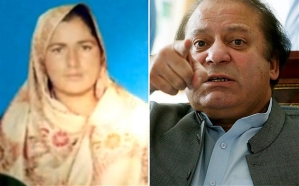Farzana Parveen, who was three months pregnant, was stoned and killed on Tuesday, police said, because she had married the man she loved.
The 25 year old woman's husband, Muhammed Iqba,l said that Pakistani police simply stood by and watched as relatives beat Parveen for nearly fifteen minutes, finally killing her in front of Pakistan city's high court, the Daily Mail reports.
'I begged them to help us but they said, this is not our duty,' said Iqbal. 'I took off my shirt (to be humble) and begged them to save her.'
Pakistan is primarily a Muslim nation in which women are expected to agree to arranged marriages. Women are not allowed to find their own mates as it is considered shameful to her family. Refusing a pre-arranged marriage can mean death-or, as Muslims call it, an "honor killing."

Pakistani Prime Minister Nawaz Sharif has demanded to know why police apparently stood by, his spokesman said today.
Sharif had taken notice of the 'brutal killing' in the presence of police, his press office said in a statement, adding that a 'totally unacceptable' crime had to be dealt with promptly by law.
'I am directing the chief minister to take immediate action and a report must be submitted by this evening my office,' it said, quoting Sharif.
Police said her father, two brothers and a former fiance were among the attackers.
Muhammad Aurangzeb, Parveen's 20-year-old stepson, described how relatives attacked Parveen, hitting her with bricks and attempting to shoot her. He said that one family member grabbed her head scarf, pulling her to the ground.
"She was screaming and crying 'don't kill me, we will give you money'," Mr Iqbal said.
He said he tried to save her but the twenty-some attackers held him back.
He reveals that at one point, six people were beating her with bricks as she screamed, and he and his stepson begged police to help. However, police simply stood by, watching the horrific killing occur.
A police officer on Tuesday quoted the father as saying the murder had been an honor killing, as Parveen had offended her family by marrying Iqbal instead of a cousin selected for her.
Last night Parveen's body was buried in the presence of some 100 mourners from her husband's family at around 2 a.m. in a village graveyard in Pakistan's eastern Punjab province. Her grieving husband said his family had chosen to bury her at night because of the gruesome state of her remains.
All of the suspects except her father have disappeared.
Parveen's lawyer, Rai Ghulan Mustafa, revealed that family members had tried to kill her before.
Earlier this month, seven of her relatives had tried to force their way into his office, where she was sitting, he said, but his colleagues had fought them off. Later they attacked her near a police station. Officers intervened and held the attackers for an hour before releasing them without charge, he said.
'She was afraid of being killed,' Mustafa said.
While honor killings are common in the Middle East, the international community has expressed outrage over this particular event.
'I do not even wish to use the phrase honor killing,' said U.N. High Commissioner for Human Rights Navi Pillay in a statement in Geneva.
'There is not the faintest vestige of honor in killing a woman in this way.'
The Human Rights Commission of Pakistan said there were 869 such attacks reported in the media last year - several a day. Women have been killed for wearing jeans, opening windows, or singing.
Baroness Sayeeda Warsi, a senior minister of state in the British government and of Pakistani origin, said she was appalled by the killing, the Daily Mail reports.
'Perpetrators must be brought to justice,' she said in a tweet






